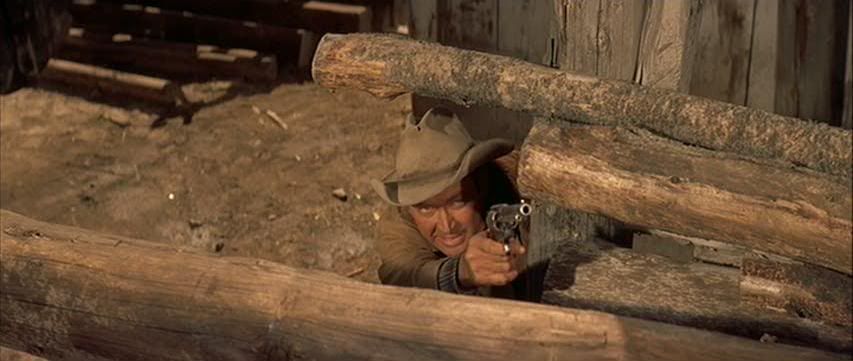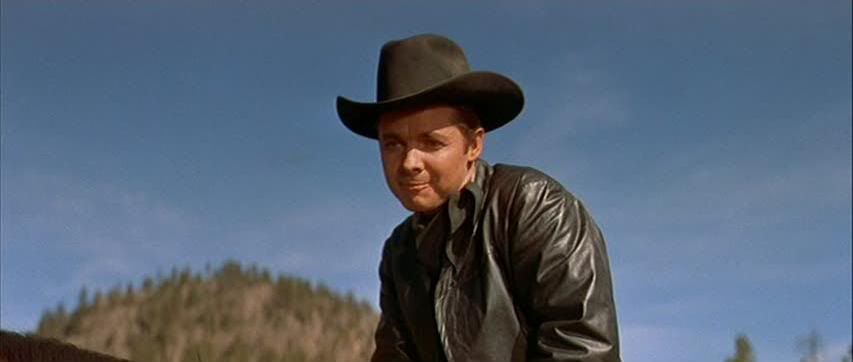
[This review has been cross-posted at Decisions At Sundown, a blog started by Jon Lanthier and dedicated exclusively to the Western genre. From now on I will be cross-posting all of my Western reviews with this blog, a valuable resource for the Western genre.]
Night Passage is best known as the film that ended the fruitful period of collaboration between director Anthony Mann and star James Stewart. The pair had made eight films together, and this was to have been the ninth, until Mann walked off the picture, citing the poor script and costar Audie Murphy. The finished film, directed instead by James Neilson, proves Mann right, and one can only regret that the Mann/Stewart friendship was ended by such a slight film — Stewart never worked with Mann again. The film itself is melodramatic and convoluted, surrounding a relatively straightforward story with all sorts of distractions and ornamentation, populating it with an oddball cast of bit players who keep wandering into the story for no apparent reason. It gives the film a weird, faux-folksy vibe, a very stagey, artificial idea of frontier life. The core of the film is a story of redemption, about the former railroad troubleshooter Grant McLaine (Stewart), who was fired from his job, suspected of working with train robbers after he allowed the outlaw the Utica Kid (Murphy) to escape. Now, Grant still hangs around the train camps, playing his accordion for money, until a string of payroll robberies cause the train management to ask him back.
This story is the film's center, and one can imagine it being made with Mann's characteristic toughness and single-mindedness, with a driven Stewart willing to do anything to redeem his shattered reputation. One can also imagine it, with twenty minutes cut out, as a stripped-down low-budget B Western. Instead, it's bloated and torturously overwritten, with so many characters crowding around the fringes of the film that it never really acquires a forward momentum. There's Grant's former girl Verna (Elaine Stewart), now married to the train company boss Kimball (Jay C. Flippen) because she'd believed Grant was a crook. There's the local restaurant girl Charlie (Dianne Foster), patiently waiting for the Utica Kid to go straight so she can marry him. There's crooked railroad man Renner (Herbert Anderson), struggling cross-country on a mule, trying to reach the robber gang to give them information. There's a kid named Joey (Brandon de Wilde) who was formerly a lookout for the gang but ran away and started hanging around Grant instead. There's an ornery old frontier woman named Ma Vittles (Olive Carey), who seems to wander into the frame whenever things are starting to get slack, to provide a bit of eccentric humor. There's a big group of tough Irish railroad workers waiting for their pay and getting antsy, brawling and dancing and running after the prostitutes kept around the camp for them. And of course there's the wild outlaw leader Whitey (Dan Duryea doing his best whiny, cackling impersonation of Richard Widmark in Kiss of Death) and his gang, among them, of course the Utica Kid.
This is a big cast for a short little Western actioner, and director Neilson can never quite manage to balance the film's many different tones against each other. The ragged comedy relief of Ma Vittles and the railroad workers, including a bickering married couple, sits uncomfortably against the darker undercurrents of Grant's beaten-down depression. And then there's the musical numbers, with Stewart lip-syncing along with a couple of accordion tunes. There's even a dramatic showdown with the Utica Kid — who turns out to be his brother — where he wins over the Kid by playing a song their father always used to play on the accordion. Neilson captures the moment by focusing on the Kid's foot as it starts tapping along with the rhythms of the music. It's silly and kind of goofy, as is the sight of Stewart lugging his accordion around with him everywhere he goes, including into battle.

The film does have a few virtues, mainly in the grandeur of its Technicolor compositions of the open range, a virtue it shares with even the worst of the period's Hollywood Westerns. Its action sequences are also satisfying, particularly the robbers' assault on the payroll train, with the Utica Kid watching it all from a high cliff, as below the other men break off into groups, each accomplishing their tasks with mechanical efficiency. Later, the multiple shootouts of the climax are inventively staged, with real urgency. The first is a confrontation in a darkened saloon after Grant smashes out all the lights and hides behind the bar, shooting through the darkness at the robbers while he makes his escape beneath the floorboards. Then, after a chase through a (suddenly sunny) valley, shot from a distance to emphasize the wide blue sky, Grant and the robbers settle in for an extended siege at an abandoned mining camp, where Grant picks off the gang one by one. Neilson obviously knows how to stage action, and these scenes are as tense and well-crafted as the rest of the film is aimless and talky.
Night Passage is obviously a second-rate Western, a meandering mess of a film that only really comes together when the trite dialogue (including Grant's corny speeches about good and evil and "the soul") is replaced by gunfire.
"The film itself is melodramatic and convoluted, surrounding a relatively straightforward story with all sorts of distractions and ornamentation, populating it with an oddball cast of bit players who keep wandering into the story for no apparent reason. It gives the film a weird, faux-folksy vibe, a very stagey, artificial idea of frontier life."
ReplyDeleteWell there you go. I can't say it better than that, but I repeat it here as I completely agree. The film is indeed overwritten, but the climax is riveting, and the Technicolor vistas are again beautifully conveyed. Also, the young Brandon de Wilde (who we sadly lost at age 32 due to a motorcycle accident) gave a fine performance here as he did in SHANE, BLUE DENIM, HUD, and ALL FALL DOWN. The scenes with Stewart playing the accordian were worse than distracting, they were embarassing. Of course it's easy to see why Man had enough and walked out.
Congratulations Ed, on what is surely to be a fruitful collaboration here with Jon and Kevin, and I'll be pulling up on my horse and entering the saloon often.
My favorite genre, I'm excited to see some more Western reviews around these parts as well as adding Decisions at Sundown to my RSS feeds.
ReplyDeleteThat said, I don't quite dislike Night Passage as much as you, although it certainly isn't Mann quality. I see it as a lesser Western but also as a light-hearted one, as if the director never really had the gall to make Stewart into the kind of cynical protagonist he'd been in -say- The Far Country. However, I like the accordion. I think it suits Stewart, probably because he was actually an accordion player, but it works against his antihero status and gives him a unique twist. Not enough to save him from some of the atrocious dialogue, but still. It's something.
Well, I read this as a pan, which is what it deserves.
ReplyDeleteThanks for the comments, guys. I'm looking forward to continuing my collaboration with Decisions At Sundown, too, it gives me a good excuse to watch more Westerns -- hopefully some that are better than this one, heh. I don't mind a good light-hearted Western, like some of Budd Boetticher's lighter efforts or Howard Hawks' laidback approaches to the genre, but this one was just goofy and awkward in its attempts at folksy humor.
ReplyDeleteIt's interesting that Stewart apparently made the film primarily because he thought it'd give him a chance to show off his accordion chops -- and then they wound up overdubbing all the accordion playing with someone else!